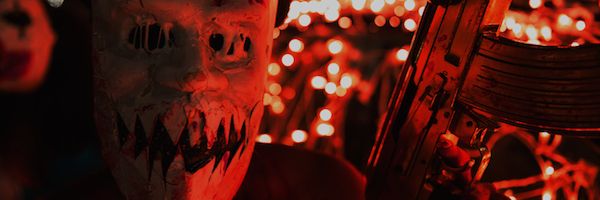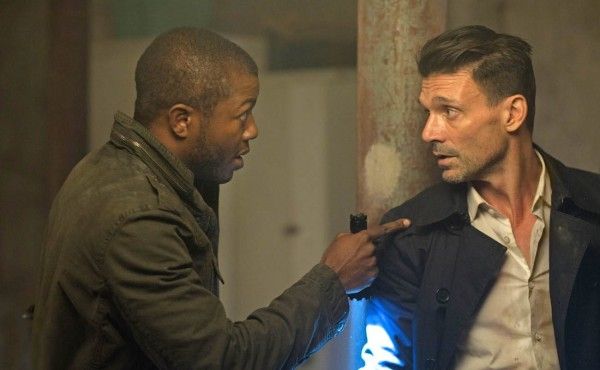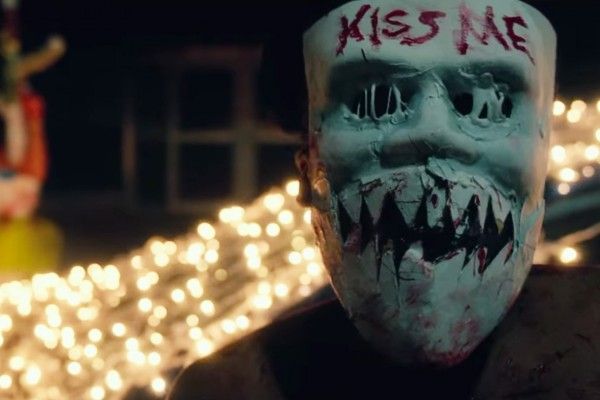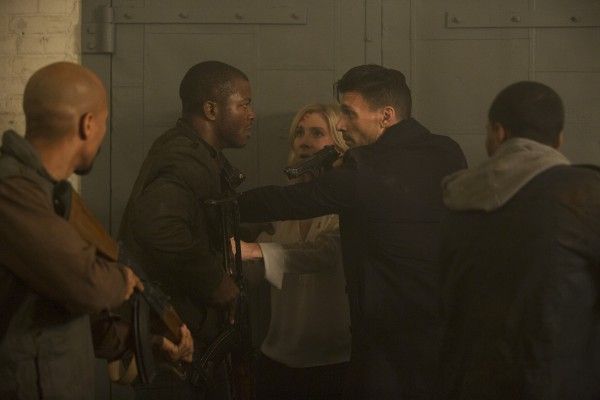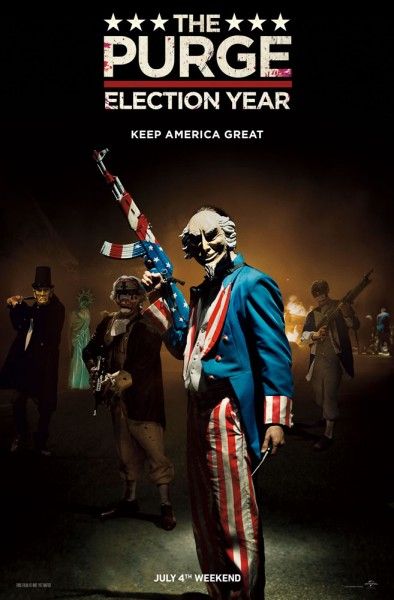The Purge: Election Year, the next terrifying chapter in the franchise about a world where one night each year all crimes are not only legal but encouraged by the government, takes place on the eve of a heated presidential election, with the nation deeply divided between those who are pro- and those who are anti-Purge. With a revolution brewing among those who believe The Purge is the leadership’s way of eliminating the poor and vulnerable, an unlikely group of allies find themselves in the middle of a conspiracy that they have to survive, if they have any hope of ever changing things.
During this exclusive phone interview with Collider, actor Edwin Hodge (who has explored the journey of Dante Bishop, from hunted to revolutionary leader, over the course of the three films) talked about the evolution of his character, how our own country has changed since the first film came out, that he had no idea how things would develop when he originally signed on, and why it’s important to fight for humanity. He also talked about the upcoming History Channel series Six, about Navy SEAL Team Six, and the grueling physical prep that he went through for the role.
Collider: Two years have passed since the events of the last film, and many things have progressed in the world since then. What can you say about where things are at now, with the state of the world, in this film?
EDWIN HODGE: It’s funny, when we first started with the first film, we saw this regressive level of what I’d like to say is ignorance, but voicing opinions that, in some ways, were just morally and ethically incorrect. We’ve pushed forward two years, and three years from the first film, and a lot of it seems to be coming to fruition. It might not be in a violent way. It might be in a financial, mental or emotional way. But in any form or fashion, people are finding a way to inflict pain and sadness on people, on a daily basis. We have this situation in Turkey, we have this situation with ISIS, and we have our own internal fights within the United States.
Whether it’s social class status or your economic status, it is very evident that the top, if they get their way, will survive and be strong. They will lead those who are helpless, in many ways, to suffer. And the suffering that’s already been placed upon them, some of these people don’t really have a choice. A lot of options aren’t given to them. So therefore, we find ourselves in a state where people are just getting tired of it and they do want to fight back. They want a better education system. They don’t want to have to wake up, every morning, and know that their water is poisoned or that their children might not have any food. That’s what we’re doing to ourselves, as a society, and it’s disheartening.
This character has gone from being hunted to being this revolutionary leader who is doing the hunting. He’s so out for blood, at this point, that it’s almost hard to see how he’s different from who he’s fighting against. How do you view Dante Bishop, at this point?
HODGE: That was a struggle that we went back and forth with. I didn’t want him to be the person he didn’t want to be. I feel like the audience wouldn’t want him to be that guy either. But at the same time, I think people are pushed to a point where they look outside of who they are, even if it is for a moment, and they try to figure out what they can do to better the situation. And a lot of times, they have to do something negative to get that done and to get their message across.
You see Dante’s evolution over the three films. First, he’s scared and on the road. In the second film, you see him for a bit when he comes in, and you get this idea that he has changed and there is something different about him, but you’re not really sure what it is. In this third film, you get the full evolution of him becoming a fighter. That’s the state of the world. A lot of people preach that, if we put guns in the hands of good people, that will outweigh the guns in the hands of bad people, but what we fail to look at is the mental stability of these people, no matter how good or bad they are. People, by nature, have a tendency to snap. We get upset at things. We get angry. I’m sure everybody has said, once or twice in their life, “God, I just want to kill you!” That’s just a thought that we have. That’s a natural thought. It is only when people act upon that, that it becomes this huge deal. We can’t just look at everybody and have surveillance everywhere in the world, but at the same time, I feel like people overlook certain things because of profit. It’s that simple.
When you look at police violence, over the last three or four years, whether you call it a social, economic or racial thing, these are the guys that we’re supposed to trust. These are the guys who are given these guns and weapons to protect us. Not to use them upon us, but to protect us, and they can’t even get it right. So, if they can’t get it right, how can you fault a society for fearing them, and fearing them in a way that makes them want to take up arms and fight back. That’s just the way it is. We have to find a way to talk again, and I fear that that is a long distance idea, at this point. If we could get passed that, we might be able to change a couple of things. But with ego, nobody is really trying to listen.
When you initially signed on to play this character, did you have any idea how he would develop or the journey he would take?
HODGE: No. To be honest with you, when I signed on for this role, I was just so intrigued by this character, in the sense that, in the first film, he has so much strength, but he didn’t really have to say anything. A lot of it was done through his eyes and his actions. For me, that showed a certain strength and quality within him that I feel a lot of people need to have. You don’t have to be the guy who is reckless and dangerous and who causes turmoil for other people. You can find a way and a solution to help those who need it. The situation in the first film turned quickly for the family. This guy who they were once trying to put back on the street became the guy who was trying to protect them. We can choose to protect one another.
Dante was a very simple but complex character, and not even the director really knew where he wanted to take him. There were a lot of discussions and talks about how we wanted to portray him, and the positive and negative images of what he’s doing and why he’s doing it. Going into this third film, there were a couple of things that I wanted to change a little bit because I just felt like he shouldn’t have made such a drastic and chaotic change. There should be some hurt, some depth and some anger, but at the same time, there should be this care for life.
For me, I just hope that I have done that, and that I didn’t just become this character who was angry and became violent. This guy has a story. He came from this obscure beginning, being on the run, to fighting back. As we look at historical events, that’s what a lot of us have had to do, being white, black or whatever. Someone is always fighting for something, and they’re always fighting for something better. Now, how that gets done is the true question. I just wanted to show the audience that what he’s doing is fighting for positive reasons, but he’s had to resort to violence to get his point across.
When this first film came out, people thought it was crazy to think that this could ever happen. But with this third film coming out and being about an election, when we’re in the middle of one of the craziest elections ever, do you worry that we could actually someday get to this point?
HODGE: Yes and no. The optimistic side of me hopes that the majority of people look at what’s going on in politics today and in the world, in general, and just say, “We’ve had enough.” We have to stop all of the fighting and talking without listening and find a sense of compromise. It’s very evident that it could possibly happen. No matter what your political views are, we’re in a very dangerous state of politics. The more we preach hatred, division and putting up a wall, the less we progress. That’s just my opinion.
Dante Bishop is willing to go so far to fight for change, but do you think he really believes that it will happen?
HODGE: That’s a good question. I would say that he is, indeed, fighting for a cause that he believes would prevail, after the end of this movie. I don’t think he knows the affect of what he’s fighting for, in the long term, but he’s fighting to get it back to what was normal and what was safe, before this all started. I think his fight is for humanity, in general. In this insane, chaotic world, you can only be insane and chaotic, and that’s what this movie proves.
You’re also doing Six for the History Channel. When you do something like that, that has its own weight to it because you want to do real SEAL teams justice, what’s it like to prepare, both physically and mentally, to properly portray somebody like that?
HODGE: There’s one word I can say, and it’s hell. In preparation for this show, we did a four-day intensive SEAL boot camp. It was crazy because it was not something that we were prepared for, and we didn’t actually have time to prepare for it. We were just thrown into the fire. I’m not going to lie to you, we were scared. We were on our way down to Encinitas to train and all of us were like, “What did we get ourselves into?” I think we were all optimistic in thinking that it wasn’t going to be as bad as we thought it might be and that they weren’t going to make us do any of the real training. But lo and behold, we got there and it was modified versions of what they usually do. It was grueling. It was mentally and physically exhausting.
The idea of brotherhood was highly pronounced, probably two hours into our training. We realized that we really had to rely on each other to get each other through the evolution. We had between six to eight evolutions a day, ranging from about an hour and a half to two hours. They pushed our bodies. I’m not the greatest swimmer, so that part of the training really got to me. They pushed me into a nine and a half foot deep pool and told me to swim. It took a lot out of me. I didn’t think I could do it, but a coach pulled me aside and we worked through some drills that I thought I’d never be able to do. I can’t swim, but they made me walk on the bottom of the pool. That proved to me that there are certain fears that I can get over. But not only are you trying to get over your fears, you’re also trying to adapt to a situation that’s unknown.
For us to go on these mile runs and do 200 push-ups, and then do another mile run, while carrying 30 or 40 pounds on our backs, or hiking a mountain with 40 or 50 pounds on our backs, it really did test our strength in many different ways, but it also only made it better for us when we got to set. We have a better understanding of what these guys go through and what it takes to get to this point of greatness. These guys, in their truest form, are superheroes. They do things that we would never do. They put themselves in situations, willingly, to fight and defend those who are completely oblivious to their actions. These guys are the creme of the crop. They are the people that you go to when you really want to get something done.
So for us, as performers, it’s very, very humbling for us to tell a true story and to make sure that when people see our characters, they are seeing the lives of those that are really out there on the battlefield. We work with three ex-SEALs, and when you sit around with these guys and listen to their life stories, which are all different, it’s interesting because, at the same time, they very much have the same mind-set. It’s brotherhood and family. They’ll go to the ends of the earth to get their job done, and they put their life on the line. We’ve been trying to keep it as true as possible, and the project is coming together to a way that I think will be beneficial to an audience, whether you’re in service or out of service, you’re the family of those in service, or just the general audience who really doesn’t know. If you’re a teenager who’s dreaming about being in the military, you’ll be able to look at this show and really, truly get a taste of what it’s like, and hopefully decide if you want to go forward with that dream. It takes a lot to be a SEAL, and not everybody can make it.
Who are you playing in Six?
HODGE: My character is new to the team. He’s a seasoned SEAL, he’s just new to this squadron. So for him, as far as the group is concerned, there is a lot of having to prove his value to the team and making sure that he steps up when somebody else falters. At the same time, he’s the guy that sits back and takes in all the information. He’s very smart, in the sense that he figures things out that people wouldn’t expect him to figure out. He’s cool and fun, and I’ve been having a great time portraying this character, as well as working with the actors that we’re working with. It really doesn’t get much better than the cast we have right now.
The Purge: Election Year is now playing in theaters.

